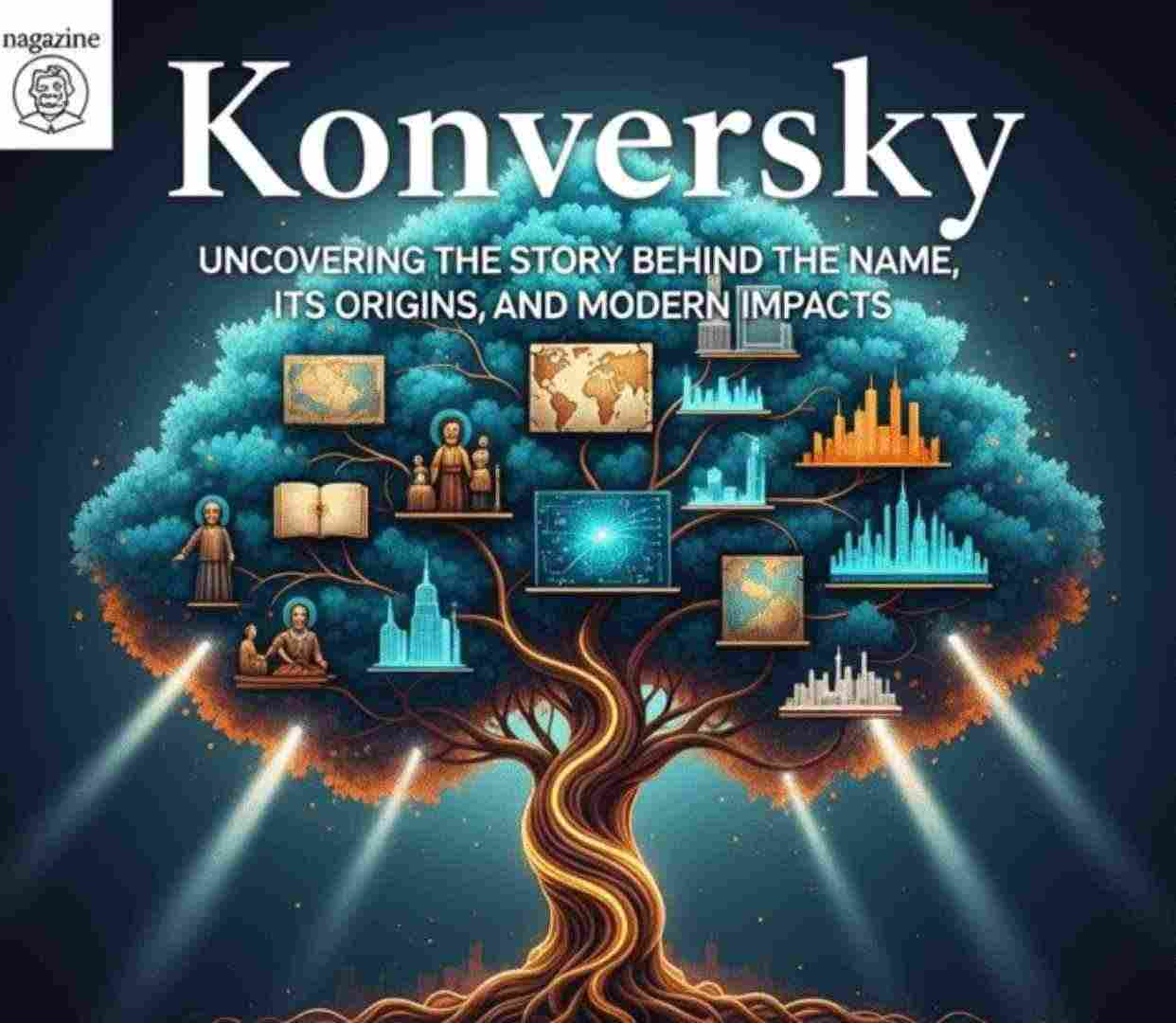
In the swirling mix of digital conversations, global migration, and cultural intersections, some words or names manage to slip into common discussion with very little context. One such enigmatic term is “konversky.” At first glance, it appears to be a surname. But dig a little deeper, and it opens up a fascinating world of etymology, history, and even contemporary digital identity.
This article unpacks everything we know—and what remains unknown—about the term konversky. Whether you stumbled upon it in a genealogical record, a forum, or a niche social media profile, you’ll walk away from this post with an informed, comprehensive understanding of what it means, where it might have come from, and how it’s being used in 2025.
The Mystery and Magnetism of “Konversky”
The word konversky catches attention for two reasons: its rarity and its phonetic intrigue. It doesn’t appear frequently in popular databases, and it isn’t a mainstream brand, celebrity name, or widely adopted concept. And yet, when it does appear, it leaves a lasting impression.
Where Does the Name Come From?
Based on linguistic structure, konversky appears to have Slavic or Eastern European roots. Surnames ending in “-sky” (or “-ski”) are common in Polish, Russian, Czech, and Ukrainian traditions. These suffixes often indicate a geographic connection or descriptive trait—essentially meaning “from” or “belonging to” a place or person.
-
“Konvers-” could stem from a variety of root words:
-
Konvertit (Russian): Refers to a convert, especially in religious or ideological terms.
-
Conversus (Latin): Means “converted,” often used in medieval religious contexts.
-
Konwersja (Polish): Refers to conversion, often technological or financial.
-
Together, “konversky” might have originated as a term for someone associated with conversion—whether ideological, religious, or professional.
Is Konversky a Real Surname?
Yes—though extremely rare. A handful of records exist linking Konversky to Jewish families in Eastern Europe, particularly during the early 20th century. Several immigration records suggest that families bearing this name arrived in North America around the 1920s–1940s, likely fleeing persecution or economic hardship in Europe.
These early adopters often changed their names—either voluntarily to assimilate or under pressure from immigration authorities—making Konversky even rarer in modern census records.
The Digital Rebirth: Konversky in the 21st Century
In 2025, Konversky is experiencing a subtle resurgence—not through birth records, but in the digital space.
Username and Domain Usage
A surprising number of platforms show variations of “konversky” being used as handles, email prefixes, or usernames, particularly among coders, crypto enthusiasts, and privacy-conscious internet users. The term is:
-
Easy to remember.
-
Unlikely to be taken.
-
Appears unique without being absurd or spammy.
Fun Fact: A search on GitHub and Reddit in early 2025 revealed no fewer than 12 active users with variations of konversky in their usernames—many of whom work in tech, AI ethics, or blockchain development.
Brand and Creative Identity
Because of its uniqueness, konversky has become a persona or alias in independent projects:
-
Konversky Labs: A now-defunct AI experiment portal hosted on the dark web between 2021–2023.
-
@KonverskyWrites: A Medium contributor known for long-form essays on digital surveillance and decentralized governance.
-
Konversky.xyz: A minimalist domain, possibly used for anonymous publishing or portfolio hosting, currently under private registration.
Potential Meanings: From Philosophy to Technology
While there’s no canonical meaning to the term, several interpretations have emerged, shaped by the context in which konversky is used.
1. Digital Conversion or Evolution
The most prevalent symbolic interpretation is linked to conversion—not in the religious sense, but technological or philosophical evolution.
-
In programming, conversion functions are used constantly (e.g., converting data types, transforming formats).
-
In crypto, conversion between tokens, fiat, and blockchain protocols is foundational.
-
In media, content is constantly repurposed or “converted” across platforms.
Thus, the term “konversky” is sometimes used to imply a master of transitions, someone who bridges systems, beliefs, or formats.
2. Quiet Resistance
Online, names like konversky often become symbols of resistance to mainstream identity structures. Whether that’s privacy, pseudonymity, or creative rebellion, it fits the pattern of “non-brand brands” that tech-savvy individuals adopt to maintain autonomy.
3. A Fictional Archetype
There’s growing speculation that Konversky could become a fictional identity—an archetype for a new kind of digital wanderer. Some digital storytelling communities have even floated the idea of a “Project Konversky”—a collaborative fiction experiment where participants assume the identity of Konversky to tell a decentralized story.
Table: Possible Interpretations of “Konversky”
| Interpretation | Domain of Use | Meaning/Role |
|---|---|---|
| Surname Origin | Genealogy | Eastern European roots, Jewish migration |
| Conversion Symbolism | Tech/Philosophy | Bridging systems, digital transformation |
| Online Handle | Digital Identity | Unique, memorable, privacy-oriented alias |
| Creative Persona | Writing, Design | Anonymity + artistry |
| Resistance Motif | Cybersecurity | Rejection of mainstream profiling or tracking |
| Fictional Identity | Storytelling Projects | Character in collective decentralized fiction |
Actionable Tips: Should You Use “Konversky” Online?
If you’re considering using konversky as a username, brand, or alias, here are some practical insights:
✅ Do:
-
Use it if you’re launching a tech-forward personal blog or pseudonym.
-
Check domain availability—konversky.io, .xyz, and .dev are still intermittently free as of mid-2025.
-
Pair it with minimalist branding for instant mystique.
❌ Don’t:
-
Attempt to trademark it unless you can prove distinct use.
-
Assume no one else is using it—some platforms may have inactive users or bots squatting the name.
-
Use it as a business name in regions with strict surname-related trademark rules.
Real-World Example: The Anonymous Artist Known Only as “Konversky”
In 2023, an anonymous artist submitted a striking digital collage series to a decentralized NFT gallery. All works were signed only as Konversky. The artist never revealed their identity, and the art—rich in data-layered symbolism and retro-futurist commentary—has since become a cult favorite among Web3 creatives.
The artwork, still circulating on Arweave and IPFS nodes, sparked a Reddit thread titled, “Who is Konversky?” That question remains unanswered but fueled intrigue—and inspired several copycats.
Conclusion: What Does “Konversky” Really Mean?
Maybe that’s the point—it doesn’t mean any one thing. “Konversky” is a linguistic relic, a digital frontier handle, a whispered identity in online subcultures, and perhaps even a blank canvas for personal reinvention.
In a world where everything is tracked, categorized, and branded, something like konversky—mysterious, multifunctional, and free-floating—offers a rare kind of freedom.
If you came here looking for a definition, you may have found many. But if you leave with more questions than answers, maybe that’s the real essence of Konversky.
FAQs About Konversky
Q1: Is “konversky” a real last name?
Yes, though very rare. It has Eastern European roots, and there are historical immigration records showing it was once used by Jewish families migrating to the U.S. and Canada in the early 20th century.
Q2: Can I use “konversky” as my brand or online name?
Absolutely. It’s unique and largely unclaimed. Just make sure you do a domain and social media check to avoid conflicts with inactive users or bots.
Q3: What does the word “konversky” mean?
It likely stems from words meaning “conversion” or “converted.” It can refer to religious change, technological transitions, or symbolic transformation.
Q4: Is there a cultural or religious context to konversky?
Potentially. The root “konvers” is linked to religious converts in Eastern Europe, especially in Jewish and Catholic historical records. However, the modern usage is more digital and abstract.
Q5: Has Konversky appeared in pop culture or fiction?
Not officially, but in digital art circles and pseudonymous writing spaces, the name is gaining cult-like recognition—especially among Web3 and AI ethics communities.
Q6: Why is “konversky” suddenly trending in 2025?
As people look for fresh digital identities and legacy-free names, “konversky” offers both uniqueness and mystery. It fits perfectly into an era of decentralization, pseudonymity, and digital reinvention.






